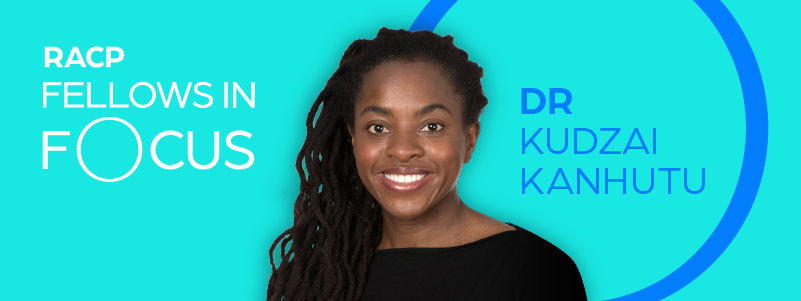RACP Fellows in Focus: Dr Kudzai Kanhutu
Date published:
28 Jun 2021

Dr Kudzai Kanhutu is an infectious diseases physician, Telehealth Clinical Lead and Deputy Medical Information Officer at the Royal Melbourne Hospital. A self-confessed health-tech nerd, she is a former board member for the Health Informatics Society Australia and clinical reference lead for the Australian Digital Health Agency.
“It was my personality, a process of elimination and then meeting a lot of people in the field that made me think infectious diseases is an amazing specialty. I just thought, wow, this is great. You get to do law, know a lot about history, geography, politics and economics. Everything somehow factors into infectious diseases,” reflected Kudzai.
On becoming a physician, Kudzai explained “The honest truth is, I tried out a lot of things and through a process of exclusion, I eliminated a whole bunch of stuff, like surgery, for example. Being still for that long with somebody who's pretty much comatose for hours, is not my thing. I spent a lot of time with physicians and I really love their approach to healthcare. They’re always really circumspect and think broadly and widely about what could be going wrong with a person. Physicians are really chatty and I love that. It's a good fit for me.”
Being a physician in infectious diseases during the COVID-19 pandemic, Kudzai shared the challenges, “It was really weird in the beginning, nobody knew what was going on.” She was told horrific stories by colleagues around the world who said, “it's the worst thing they've ever experienced.” However, it hadn't arrived here in Australia yet, so it was a little difficult for her and her colleagues to wrap their heads around. Kudzai volunteered that the ‘weird’ started with an overwhelming sense of anxiety, “It's all unravelling across the world. You have this moment where you ask yourself ‘What can we offer? What can I do? What can we do together?’ I can't fly overseas and volunteer somewhere, but what can we do to get ready? And then 2020 just exploded.”
“It’s been a very interesting time but at the same time, a time of real mindfulness and remembering to focus on the stuff that's really going to make a difference.”
Kudzai’s natural effervescence is magnetic, so what does she think are her most valuable skills? She enthused “I think the beautiful thing about physician training is that we all go through the same basic process at the front-end. We're doing all our long cases, short cases, learning the process of how you approach a clinical quandary and what you need to be thinking about in order to get to a point where you can make a reasonable decision about what's the next best thing one can do. There's always something new happening, something new changing and you always have to re-evaluate and reassess. I feel like my skills come into play in a lot of the things that I do, not only at work but outside, as well in terms of how I approach people and situations. A lot of my finer strategic processes have been really enhanced by the process that I had to go through. It's a great foundation of professionalism and the approach that you take to your work.”
When talking to the influences that have allowed her to develop said skills, she beamed “The people who have influenced me the most have not been people at work. It's usually people outside of work. My aunty and my relatives have been an incredible source of inspiration for me, especially the ones who worked in healthcare. I had lots of relatives who worked as nurses and midwives, birthing babies in the middle of nowhere. One, who worked in the prison services, looked after women who are incarcerated and their families. I've seen the breadth, scale and scope of what you can do in healthcare.”
Kudzai speaks eloquently about the natural challenges presented in a life of healthcare, “The biggest challenge for me has been realising that a lot of the people who have mentored me, grew up in a time when housing was ridiculously cheap, comparatively.
"Education was comparatively cheap, and they didn't have a lot of the pressures around childcare and so on. How do you forge your way when you're having to rely on speaking with people who grew up in a different time and a different place? The biggest challenge has been actually having the courage and the confidence to forge your own pathway.”
Kudzai told us, when asked about the influence of her activities with the College on healthcare, “I was really happy to be chosen as the RACP's representative on the refugee and migrant women's health initiative. We wanted to bring people together from all of the colleges – psychologists, obstetrics, psychiatry, nursing, midwifery physicians, surgeons, all of them, and come together with a series of guidelines. When you’re a migrant woman the healthcare options are amazing, but you need help to understand the processes.”
On what would be Kudzai’s advice to trainees trying to follow in her footsteps, “The best analogy I can give is, it's like when you're on a scooter, you've got one foot on the ground, and one foot on the board to keep you moving forward. I've always tried to have an anchor point. So, if you're going to try and be somewhere in your career, try and have a stable anchor point where you're like, okay, I'm still doing something that feels really familiar and feels like the right thing. You don't have to leave completely, just find that right blend that will make you have the courage to try new things without feeling like you've abandoned ship.”
Watch Dr Kudzai Kanhutu reflect on her career journey